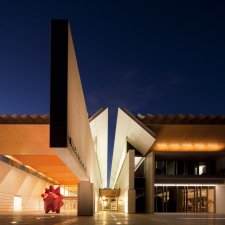- About us
- Support the Gallery
- Venue hire
- Publications
- Research library
- Organisation chart
- Employment
- Contact us
- Make a booking
- Onsite programs
- Online programs
- School visit information
- Learning resources
- Little Darlings
- Professional learning
Richard Flanagan (b. 1961) was born in Longford in northern Tasmania, the second youngest of the six children of Archie Flanagan, a primary school principal, and his wife Helen. Growing up in Rosebery, a mining town on the west coast, Flanagan was into the outdoors from a young age and with his mates was venturing unsupervised into the wilderness by the time he was thirteen. At sixteen he left school and worked as a labourer. By age twenty, however, he was at the University of Tasmania, from which he graduated – with first class honours – in 1982. The following year he was awarded a Rhodes Scholarship which enabled him to undertake a Master of Letters in history at Worcester College, Oxford.
Returning to Tasmania, he undertook what he has called his apprenticeship as a writer by producing four works of non-fiction. Among them was Codename Iago, an 'autobiography' of the German-born Australian conman John Friedrich which Flanagan ghost wrote in six weeks because he needed the money to finish work on his first novel, Death of a River Guide (1994). Drawn from Flanagan's own experiences kayaking and guiding on the Franklin River – including an instance where, like the novel's protagonist, he was trapped underwater in a capsized kayak – Death of a River Guide won the Victorian Premier's Prize for Best First Fiction in 1995 and the National Fiction Award in 1996, and was hailed by the TLS as 'one of the most auspicious debuts in Australian writing'. His next novel The Sound of One Hand Clapping (1997) was partly inspired by his wife Majda, the daughter of Slovenian migrants. It won the Victorian Premier's Prize for Best Novel in 1998 and was adapted for a film of the same name which Flanagan wrote and directed and which was in contention for the Golden Bear at the 48th Berlin International Film Festival. Gould's Book of Fish (2001), a wicked, magical-realist reimagining of the life of convict artist William Buelow Gould, won Flanagan another Victorian Premier's Award as well as the Commonwealth Writers Prize for 2002. Flanagan published another two novels – The Unknown Terrorist (2006) and Wanting (2008) – before the appearance of The Narrow Road to the Deep North (2013). Drawn in part from Flanagan's father's experiences as a prisoner of war, the novel was also inspired by the extraordinary exploits of Australian Army doctor Edward 'Weary' Dunlop and his work with POWs on the infamous Burma Railway. The Narrow Road to the Deep North won a swag of honours and made Flanagan the third Australian writer (after Thomas Keneally and Peter Carey) to win the Man Booker Prize, awarded annually to 'the best novel written in English.' Significantly, Flanagan won the Booker in the first year that it was opened to writers from outside the Commonwealth. Flanagan revisited the idea of the ghost-written autobiography with his seventh novel, First Person (2017); and in 2020 he published his eighth novel, The Living Sea of Waking Dreams.
In addition, Flanagan has written long-form journalism and essays for publications such as The Monthly, The New Yorker and Le Monde, and produced and co-edited a total of seven works of non-fiction including A Terrible Beauty: a history of the Gordon River Country (1985) and Toxic: the Rotting Underbelly of the Tasmanian Salmon Industry (2021). Flanagan has formerly cited his father Archie – who was the only member his family to attain a basic education – as the impetus for his career as writer. 'He had a very strong sense of the beauty and magic of written words', Flanagan said in an interview with the Sydney Morning Herald in 2017, '[and] he saw how oppressive it was when you didn't have access to the written word, and how liberating and transcendent if you did. ... People who come from generations of literacy might have lost that sense of its transcendent and liberating power, but I got it from my father. Words have been like a magic carpet for me that have taken me far away from this island.'
Gift of the artist 2022
© Julian Meagher
Julian Meagher (1 portrait)



On one level The Companion talks about the most famous and frontline Australians, but on another it tells us about ourselves.



Visit us, learn with us, support us or work with us! Here’s a range of information about planning your visit, our history and more!



We depend on your support to keep creating our programs, exhibitions, publications and building the amazing portrait collection!